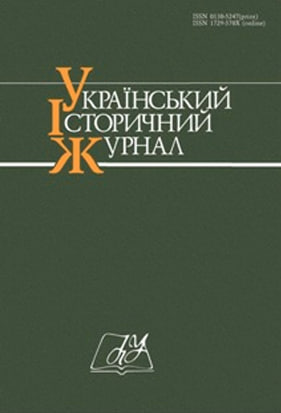Education in the Parliamentary Activities of Ukrainian Members of Parliament in the Polish Sejm in 1922—1927
DOI:
https://doi.org/10.15407/uhj2023.02.096Keywords:
рarliament of the Polish state (first term of office), Ukrainian parliamentary repre sentation, education legislation, education institutions, political parties, national minoritiesAbstract
The aim of this research is to highlight the specific features of the activities of Ukrainian Members of Parliament (MPs) in the Parliament of the Polish state in 1922—1927 (first term of office), which were directed at defending the right to education of Ukrainians.
The research methodology is based on the principles of coherence, historicism, objectivity, and comprehensiveness, as well as scientific, systemic, and multi-factor approaches. The following methods were used: chronological, analysis and synthesis, comparative, and behavioral analysis.
Academic novelty. For the first time in Ukrainian historiography, this study provides a complex overview of the activities of Ukrainian MPs, aiming at defending the right to education of their people. It analyses their actions in the Polish Parliament (Sejm) in 1922—1927, providing a comparative analysis of parliamentary speeches, political discussions, submitted documents, and interpellations.
Conclusions. Issues related to education were important in the work of the Polish Parliament of the period under discussion. Ukrainian MPs, as well as their German and Jewish colleagues, were raising the issue of schooling and criticized the state’s educational policy on every occasion: during the appointment of Prime Ministers, a discussion of the Ministry of Religion and Education budget, legislative discussions, etc. Ukrainian politicians used the Parliament as a platform to voice their concerns and to defend the basic rights of their voters, guaranteed by domestic legislation and international treaties, to expand the network of Ukrainian-language schools, and to provide conditions for their unimpeded activities. They also tried to improve the situation of schooling for Ukrainians by introducing legislative initiatives, inquiries, and interpellations, which raised such important issues as the adoption of educational legislation in consultation with minorities, development of non-Polish educational institutions of all types, ending Polonization, stopping the persecution of teachers of Ukrainian, Belarusian, German and Jewish nationalities. Common interests served as the basis for parliamentary cooperation among MPs from different nationalities, which manifested itself in the introduction of joint submissions, interpellations, voting, etc. Situational allies of minority MPs were members of the Polish left, supporting certain of their educational demands. Instead, representatives of Polish right-wing parties tried to hinder the implementation of educational initiatives of minority MPs. They also contributed to the creation of a legal basis for the development of Polish-language and Utraquist (bilingual) schools designed to accelerate the assimilation of minorities.


